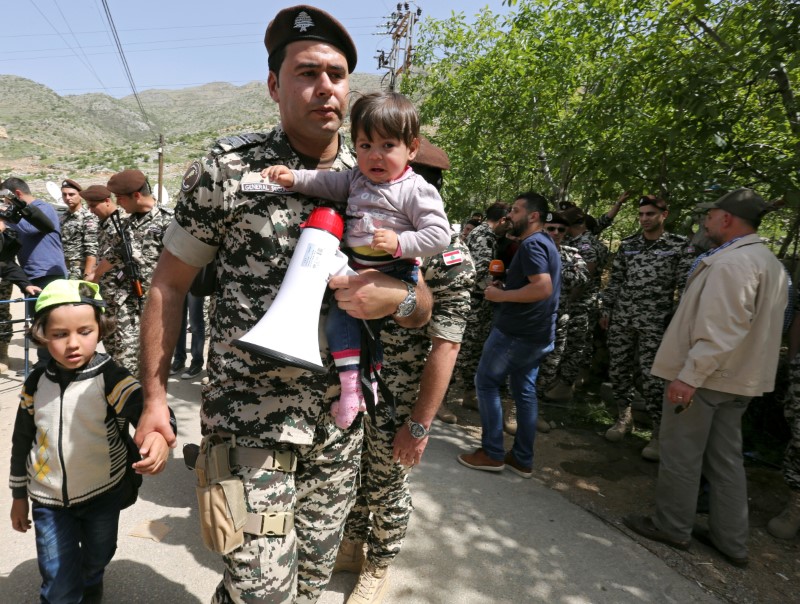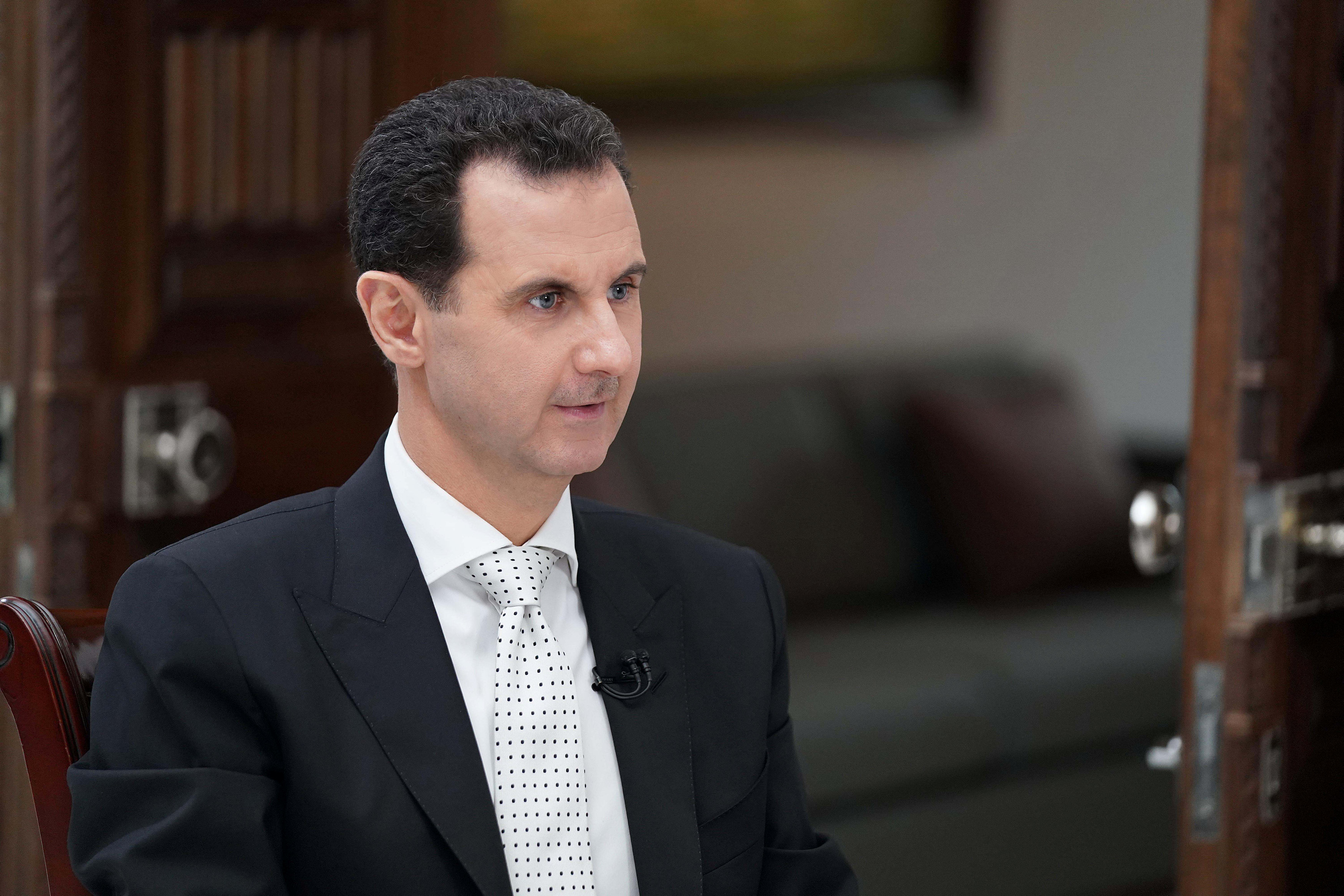
By Joseph Nasr
BERLIN (Reuters) – Husam Idris dreams of returning to his bakery in the Syrian city of Aleppo. But three years after escaping the war, he worries that a new law allowing the Syrian government to seize homes for redevelopment will scupper his plans.
“I grew up in the bakery. I can’t imagine losing it,” said Idris, a 37-year-old father of three who now lives in Germany.
While Syria’s Law 10, or Decree 10, has yet to be applied, rights groups and governments hosting Syrian refugees say they risk becoming permanent exiles if they lose their properties because it would remove a major incentive to return one day.
Idris is at the Syrian embassy in Berlin trying to arrange power of attorney for his mother back home so she can stake a claim to his bakery and apartment in the Kallaseh neighborhood of Aleppo, recaptured from rebels two years ago.
He is not alone. The new law has prompted a rush of visitors to the embassy.
One worker at the mission, who declined to give his name, said that since the law came into effect in April, 10 to 15 Syrians had come each day to request power of attorney for relatives at home, up from a handful beforehand.
According to the U.N.’s refugee agency, 6 million Syrians have been displaced within the country and there are nearly 5.5 million refugees outside Syria.
Germany hosts some 650,000 Syrians, the most of any Western country, and it is particularly worried about the law.
Berlin’s fear is that President Bashar al-Assad could use Law 10 to bulldozer former opposition bastions seized by the government and replace them with new property developments populated by government supporters.
“Decree 10 is designed to expropriate refugees,” a senior German government official said.
“It is pretty clear that Assad’s goal is to replace the old population with a new one,” said the official, who was briefed on talks between German Chancellor Angela Merkel and Russian President Vladimir Putin about the issue.
The Syrian government has dismissed concerns about the law as a “disinformation campaign”. It says it needs to rebuild areas destroyed in the war and regulate illegal settlements.
“This law comes within the framework of the Reconstruction Program, and has an organizational character aimed at regulating slum areas in Syria, especially in light of the destruction of many of the areas that were controlled by terrorists,” Syria’s mission to the United Nations in Geneva said last month.
SECURITY COUNCIL
What started out as protests against Assad in 2011 turned into a civil war that has often pitted the country’s Sunni majority against Assad’s minority Alawites and Shi’ite allies. Russia intervened militarily in 2015 to help swing the conflict in favor of Assad.
Within the region, Turkey is home to 3.5 million Syrian refugees and there are nearly 1 million living in Lebanon, which has also expressed concern Law 10 could discourage the mainly Sunni refugees there from returning.
Law 10 originally gave proprietors 30 days to prove ownership or lose their rights. The Syrian government extended the period to one year earlier this month to allay fears refugees and the displaced could lose their homes.
Besides Russia, Germany has raised concerns about the Syrian legislation with its European Union partners and has managed to get the issue onto the U.N. Security Council’s agenda.
“The fact that the U.N. Security Council has taken note of the decree is a good starting point,” said a second German official. “But clearly effective pressure on Assad not to implement the decree has to come from Russia.”
While Law 10 says relatives in Syria can stake claims, Syrian lawyers say in practice power of attorney still needs to be given to an individual so the authorities know which relative is the chosen legal agent. Lawyers and rights groups also say anyone making a property claim needs to have security clearance.
They say this could lead to Syrians who fled former opposition strongholds being disenfranchised.
“The regime has a history of arbitrary expropriations to serve its economic and security interests and unfair land expropriations was one of the triggers of the rebellion,” Syrian human rights lawyer Anwar al-Bunni said.
“Who is going to dare claim property in an opposition area that the regime turned into rubble because it views its inhabitants as Sunni terrorists? Even if they dared, they will not get clearance if the regime wants the land,” he said.
LAW 66
Human rights groups, Syrian lawyers and refugees said a previous law pitched by the government as necessary for redevelopment had been applied in opposition areas to force out inhabitants perceived as dissenters.
They said Law 66, approved by Assad in 2012 to redevelop slums in Damascus, was applied in neighborhoods southwest of the capital where anti-Assad protests erupted at the start of the rebellion in 2011, including in Basateen al-Razi.
Local authorities used land there expropriated under Law 66 for a luxury residential project of 12,000 housing units which Assad inaugurated in 2016. Now, some Syrian refugees fear Law 10 will be used in a similar way nationwide.
“The problem is not in the law itself. The problem is how and where it’s going to be implemented,” said Sinan Hatahet, a Syria expert at Al Sharq Forum think-tank.
“If you lived in a bombed-out opposition area you’re most likely not going to get security clearance so your right to ownership is automatically gone,” he said.
France said the law was a serious obstacle to a lasting political solution to the Syrian conflict as it allowed refugees’ property to be plundered.
“This is a new stage in the brutal strategy of crowding out entire sections of the Syrian population that the Damascus regime has been implementing for several years,” Foreign Ministry spokeswoman Agnes Von der Muhll said in response to Reuters’ questions.
‘FORGET THE PAST’
At the Syrian embassy in Berlin, refugees queue in a room with three counters for consular services, a picture of Assad over the middle counter looking out on about 50 people waiting their turn.
Of the handful of Syrians who agreed to talk to Reuters about Law 10 most asked to be identified by nicknames, saying they feared for their safety and that of loved ones in Syria.
One man who goes by the nickname Abu Ahmed was at the embassy to give power of attorney to his brother, so he can stake a claim to Abu Ahmed’s depot in Yarmouk, a district of Damascus established as a Palestinian refugee camp in 1957.
Like many of the buildings in Yarmouk, Abu Ahmed’s depot used for storing and selling light bulbs was built illegally. The only proof of ownership he has are certificates from a notary.
“My wife thinks I’m crazy to obsess about the depot. The whole camp has been turned into rubble and we are lucky to be alive,” said the 47-year-old trader.
He has little hope the government will grant his brother security clearance should Yarmouk be redeveloped.
“We are marked because we lived in Yarmouk. The moukhabarat (secret police) will never give us security clearance but I have to try,” said Abu Ahmed, who now lives in Berlin.
The Norwegian Refugee Council estimates that about half of Syrian’s pre-war population of 22 million lived in urban areas with about a third of those in slums.
“They don’t need laws to steal our properties. They do as they please and no one can stop them,” said Um Ahmed, standing by her husband. “I keep telling Abu Ahmed, ‘forget the past,’ but he can’t. He still dreams of a return.”
Outside the embassy in Berlin, Idris wonders if asking his mother to act as agent for his Aleppo bakery was the right decision.
“She is old, ill and probably won’t live much longer,” he said. “My brothers and sisters are in Turkey so my cousins are the only other option. But they’ve lost everything and have no income. They’ve been selling land they own outside Aleppo for peanuts to survive. They’ll probably sell my property too.”
(Additional reporting by Angus McDowall in Beirut, John Irish in Paris, Stephanie Nebehay and Tom Miles in Geneva; editing by David Clarke)












